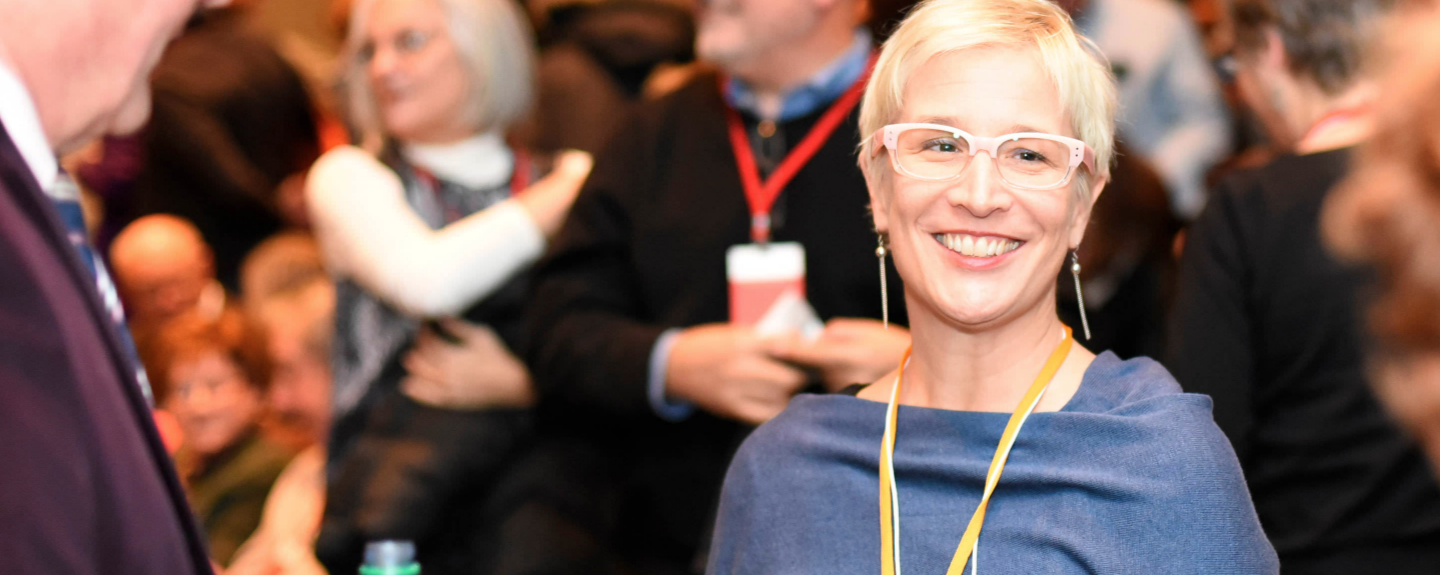
Humanistic inquiry in challenging times
Anthropologist Jessica Winegar will succeed Professor of English Wendy Wall as director of the Kaplan Institute for the Humanities
By Rebecca Lindell
There will be a changing of the guard at the Alice Kaplan Institute for the Humanities this fall — but the spirit of dynamic inquiry that has long distinguished the Institute will continue.
Professor of English Wendy Wall, who has led the Institute since 2013, will be succeeded by Professor of Anthropology Jessica Winegar. The appointment is effective Sept. 1.
“Jessica has been a leader in internationalizing and reshaping humanities conversations across Northwestern and beyond,” Wall said. “Her leadership, her institutional savvy, her intelligence and her commitment will serve her well as she stewards and reinvents Kaplan. I know the Institute will continue to thrive and evolve under her trusty leadership.”
The Kaplan Institute is the driver of some of the most innovative teaching and scholarship at Northwestern, providing a humanistic and interdisciplinary lens through which to explore issues across the academic spectrum. Key programs include the Kaplan Humanities Scholars Program, a team-taught exploration of the humanities for incoming first-years students, as well as fellowships for faculty and graduate students that enable scholars to develop new cross-disciplinary course offerings and research. Speakers, workshops and other interactive events promote vigorous dialogue and exploration of the humanities throughout the academic year.
Energizing teaching and research
“Sometimes, when an academic steps down from an administrative position, they can feel weary and eager to move on,” said Wall, the Avalon Professor of the Humanities. “Serving as director of Kaplan has had quite the opposite effect on me. I have truly been energized in my teaching, research, and sense of what a university can be. It’s forced me to move outside my comfort zone, which is early modern English literature and culture, to make truly fascinating discoveries about other time periods, other disciplines, other objects of studies and methods.”
Indeed, under Wall’s leadership, the Kaplan Institute has introduced and expanded numerous signature programs, including the Global Humanities Lab, an investigation of an international humanities topic through experiential learning and offsite research; the Humanities Plunge, which immerses Northwestern students in Chicago’s artistic offerings; and initiatives that use digital tools to advance the humanities.
“My fellow travelers at Kaplan have helped me to see how truly vital the humanities are at a time when some are skeptical of education that is not narrowly perceived as instrumental,” Wall said.
“And they’ve helped me to see how vital the humanities and arts are in times of emergency. Imagine data without a contextualizing narrative, whether it concerns public health or racial injustices. Imagine solutions to food scarcity or climate crisis without an understanding of the language and cultures throughout the world. I’ve seen scholars who have found it newly urgent to translate what they do to the public at large, and to learn from that experience. And it’s been fabulous to see.”
Reshaping the humanities for a ‘more just world’
Winegar, a sociocultural anthropologist who specializes in cultural politics, has been a key member of the Kaplan community for years. She led the Institute’s first Global Humanities Lab to Istanbul, has taught twice in the Kaplan Humanities Scholars Program, and has served on the Humanities Council. She also served as interim director of the Institute in 2017-18.
Winegar’s body of work focuses on how people invest social arenas — such as art worlds, education and political protest — with liberating potential, while re/producing hierarchies of gender, class, race/ethnicity and generation. Her current book project, Counter-Revolutionary Aesthetics: How Egypt’s Uprising Faltered, examines how aesthetic forms, judgments and practices play a central role in both delegitimizing revolutionary actions and in producing everyday right-wing attachments.
In addition to her appointment in the Department of Anthropology, Winegar is a core member of the faculty in the Program in Middle East and North African Studies. Her research and teaching draw on a range of disciplines and extend to how U.S. institutions deal with the MENA region.
“I am incredibly grateful to Wendy and all of the transformative work she did to make the Kaplan Institute what it is today,” Winegar said.
Winegar added that she holds a “deep sense of responsibility to further humanistic inquiry in these challenging times.”
“At this moment, we have an opportunity to rethink what we do not only as scholars and teachers of the humanities, but also as members of society,” she said. “We might even consider this an obligation — a call to transform the academy and reshape the broader role of the humanities towards a more just world. I look forward to working with my colleagues to shape this next era.”
Back to top